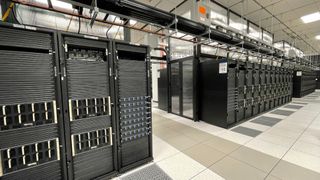IS THAT A REAL SUPERCOMPUTER
OR A METAVERSE SUPERCOMPUTER
Meta says the AI Research SuperCluster will be the ‘world’s fastest AI supercomputer’.

Meta says the AI Research SuperCluster will be the ‘world’s fastest AI supercomputer’.

(Image credit: Meta)
Meta (née Facebook) has announced it is building its own AI supercomputer in support of its efforts to bring the metaverse to fruition.
The AI Research SuperCluster (RSC) is already up and running at reduced capacity. But once complete, Meta says the RSC will be the world’s fastest supercomputer of its kind.
The new machine will be used to train massive new speech recognition, language processing and computer vision models, which will underpin the company’s next generation of AI-driven applications.
A supercomputer for the metaverse
The fully-formed RSC will be powered by 16,000 Nvidia A100 GPUs, collected into compute nodes and hooked up using the latest InfiniBand interconnect fabric.
Meta is also partnering with PureStorage, whose high-performance FlashBlade and FlashArray technologies will help build out a storage system for the RSC capable of housing up to an exabyte of data (equal to one million TBs).
Early benchmarks show that RSC as it exists today is capable of outperforming Meta’s previous-generation AI infrastructure by roughly 20x across some workloads, a figure that will obviously rise once construction is completed later this year.
Meta researchers are already using the RSC to train large-scale natural language processing (NLP) and computer vision models much more quickly than previously possible. And in future, the company hopes to train models with upwards of one trillion parameters, which will go on to play a role in its metaverse product portfolio.
“We expect such a step function change in compute capability to enable us not only to create more accurate AI models for our existing services, but also to enable completely new user experiences, especially in the metaverse,” wrote Meta.
“Our long-term investments in self-supervised learning and in building next-generation AI infrastructure with RSC are helping create the foundational technologies that will power the metaverse and advance the broader AI community as well.”
Although the firm offered no specifics as to what these new metaverse experiences might look like, a similar sentiment was reiterated in a Facebook post by CEO Mark Zuckerberg.
“The experiences we’re building for the metaverse require enormous compute power (quintillions of operations/second) and RSC will enable new AI models that can learn from trillions of examples, understand hundreds of languages and more,” he said.
Also check out our lists of the best cloud hosting, best dedicated server hosting and best bare metal hosting services
Joel Khalili is a Staff Writer working across both TechRadar Pro and ITProPortal. He's interested in receiving pitches around cybersecurity, data privacy, cloud, storage, internet infrastructure, mobile, 5G and business hardware.
Meta (née Facebook) has announced it is building its own AI supercomputer in support of its efforts to bring the metaverse to fruition.
The AI Research SuperCluster (RSC) is already up and running at reduced capacity. But once complete, Meta says the RSC will be the world’s fastest supercomputer of its kind.
The new machine will be used to train massive new speech recognition, language processing and computer vision models, which will underpin the company’s next generation of AI-driven applications.
A supercomputer for the metaverse
The fully-formed RSC will be powered by 16,000 Nvidia A100 GPUs, collected into compute nodes and hooked up using the latest InfiniBand interconnect fabric.
Meta is also partnering with PureStorage, whose high-performance FlashBlade and FlashArray technologies will help build out a storage system for the RSC capable of housing up to an exabyte of data (equal to one million TBs).
Early benchmarks show that RSC as it exists today is capable of outperforming Meta’s previous-generation AI infrastructure by roughly 20x across some workloads, a figure that will obviously rise once construction is completed later this year.
Meta researchers are already using the RSC to train large-scale natural language processing (NLP) and computer vision models much more quickly than previously possible. And in future, the company hopes to train models with upwards of one trillion parameters, which will go on to play a role in its metaverse product portfolio.
“We expect such a step function change in compute capability to enable us not only to create more accurate AI models for our existing services, but also to enable completely new user experiences, especially in the metaverse,” wrote Meta.
“Our long-term investments in self-supervised learning and in building next-generation AI infrastructure with RSC are helping create the foundational technologies that will power the metaverse and advance the broader AI community as well.”
Although the firm offered no specifics as to what these new metaverse experiences might look like, a similar sentiment was reiterated in a Facebook post by CEO Mark Zuckerberg.
“The experiences we’re building for the metaverse require enormous compute power (quintillions of operations/second) and RSC will enable new AI models that can learn from trillions of examples, understand hundreds of languages and more,” he said.
Also check out our lists of the best cloud hosting, best dedicated server hosting and best bare metal hosting services
Joel Khalili is a Staff Writer working across both TechRadar Pro and ITProPortal. He's interested in receiving pitches around cybersecurity, data privacy, cloud, storage, internet infrastructure, mobile, 5G and business hardware.
No comments:
Post a Comment